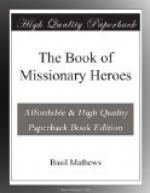At night the cries of beaten women rose, and the weird chants of incantations and of foul unclean dances were heard. Khamane called the older men together around his fire. Pots of beer passed from hand to hand. As the men grew fuddled they became bolder and more boastful. Khamane then spoke to them and said, “Why should Khama rule you? Remember he forbids you to make and to drink beer. He has done away with the dances of the young men. He will not let you make charms or throw enchanted dice or make incantations for rain. He is a Christian. If I ruled you, you should do all these things.”
When Khama rode back again into his town he saw men and women lying drunk under the eaves of their huts and others reeling along the road. At night the sounds of chants and drinking dances rose on the air.
His anger was terrible. For once he lost his temper. He seized a burning torch and running to the hut of Khamane set fire to the roof and burned the house down over his drunken brother’s head. He ordered all the beer that had been brewed to be seized, and poured it out upon the veldt. He knew that he was fighting a fiercer enemy than the Matabele, a foe that would throttle his tribe and destroy all his people if he did not conquer it. The old men of the tribe muttered against him and plotted his death. He met them face to face. His eyes flashed.
“When I was still a lad,” he said, “I used to think how I would govern my town and what kind of a kingdom it should be. One thing I determined, I would not rule over a drunken town or people. I WILL NOT HAVE DRINK IN THIS TOWN. If you must have it you must go.”
The Fight with the White Man’s “Fire-water"
Khama had conquered for the moment. But white men, Englishmen, came to the town. They set up stores. And in the stores they began to sell brandy from large casks.
The drinking of spirits has more terrible effects on the African than even on white men. Once he starts drinking, the African cannot stop and is turned into a sot. The ships of the white man have been responsible to a terrible extent for sending out the “fire-water” to Africa.
Khama called the white traders in the tribe together.
“It is my desire,” he said, “that no strong drink shall be sold in my town.”
“We will not bring the great casks of brandy,” they replied, “but we hope you will allow us to have cases of bottles as they are for medicine.”
“I consent,” said Khama, “but there must be no drunkenness.”
“Certainly,” the white men replied, “there shall be no drunkenness.”
In a few days one of the white traders had locked himself into his house in drunken delirium, naked and raving. Morning after morning Khama rose before daybreak to try and get to the man when he was sober, but all the time he was drunk. Then one morning this man gathered other white men together in a house and they sat drinking and then started fighting one another.




